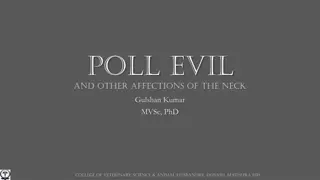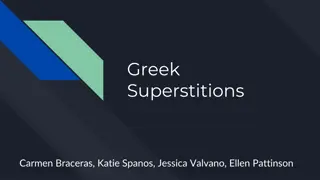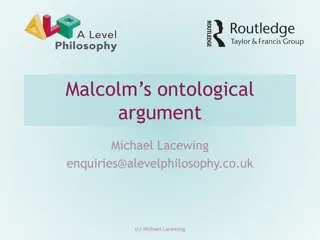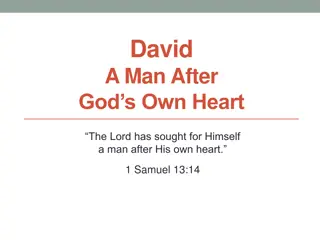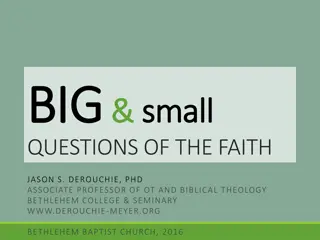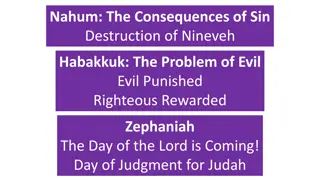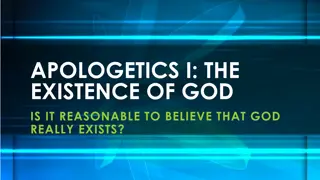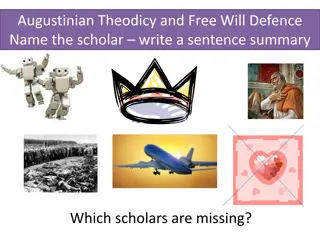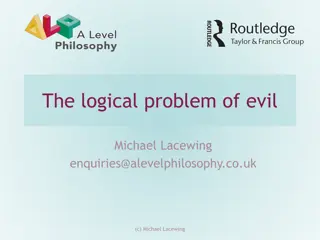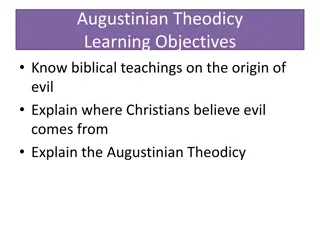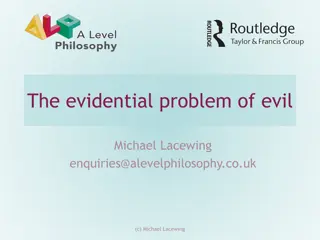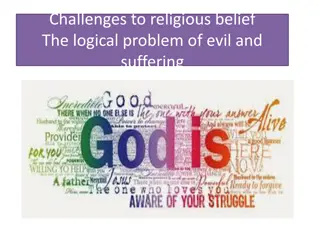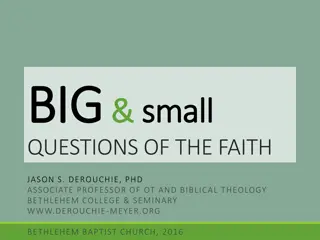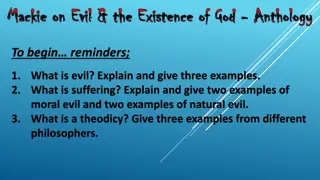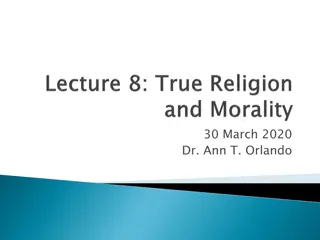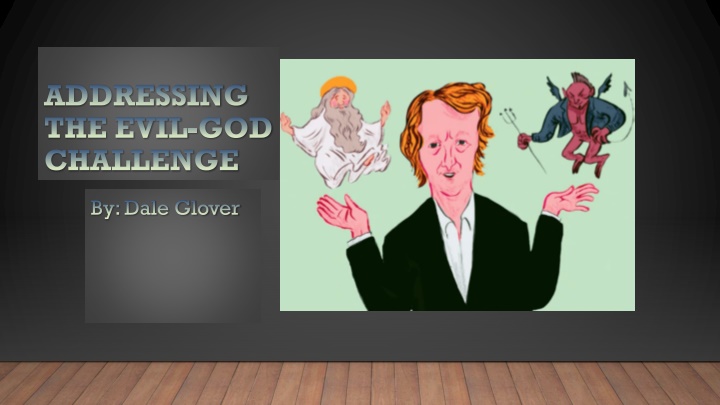
Unraveling the Evil-God Challenge with Dale Glover
Explore the thought-provoking Evil-God Challenge introduced by philosopher Stephen Law, examining the contrast between the Good-God and Evil-God hypotheses and the Symmetry Thesis. Dive into the historical development, the concept of symmetry, and the fundamental versions of this intriguing philosophical inquiry.
Download Presentation

Please find below an Image/Link to download the presentation.
The content on the website is provided AS IS for your information and personal use only. It may not be sold, licensed, or shared on other websites without obtaining consent from the author. If you encounter any issues during the download, it is possible that the publisher has removed the file from their server.
You are allowed to download the files provided on this website for personal or commercial use, subject to the condition that they are used lawfully. All files are the property of their respective owners.
The content on the website is provided AS IS for your information and personal use only. It may not be sold, licensed, or shared on other websites without obtaining consent from the author.
E N D
Presentation Transcript
ADDRESSING THE EVIL-GOD CHALLENGE By: Dale Glover
WHAT IS THE EVIL-GOD CHALLENGE? Classical theism- notion that there exists a single omnipotent (all powerful), omniscient (all knowing), omnibenevolent (all good) God (known as the Good-God hypothesis or GGH ). (Let a good-God = GG and an evil god = EG for short). Think of various arguments for and against your belief in God. Do any of these prove God is good/omnibenevolent vs. being evil/omnimalevolent (i.e., that the Evil-god hypothesis or EGH is true)? What justifies your belief that the GGH is more reasonable than the EGH? At it s most foundational level, the Evil-god Challenge (or EGC ) is simply a request for this justification from Good God hypothesizers (usually in the hopes of undermining one s belief in a GG).
HISTORICAL DEVELOPMENT OF THE EGC The term EGC was first coined and popularized back in 2010 by the Atheist philosopher Stephen Law in his paper, The evil-god challenge . However, over the past 50 years, many philosophers have employed an EGC-like strategy under different names (such as the challenge from antitheism , maltheism , demonism , devilism or evilism . Question: What does one mean by an EG in the first place? Many different definitions exist (e.g. maximally selfish, maximally hateful, etc.), thus, the EGC refers more to a family of arguments which argue that the existence of an omnipotent, omniscient, perfectly evil being is as likely as the existence of a GG. The notion that there is symmetry between a GG and an EG in this way has come to be known as the symmetry thesis .
THE SYMMETRY THESIS The symmetry thesis can be represented by envisioning the pointer of a set of weighing scales which, after all evidential considerations are taken into account, roughly balance out. Law only argues for broad symmetry - meaning arguments in support of the GGH turn out, overall, to provide much the same sort of support for the EGH (Law, p.359). Some examples of local asymmetries that Law admits but thinks don t tend to tip the scales significantly in any relevant way are appeals to the Christian story of the Fall, or the inherent goodness of free-will or arguing that there is significantly more good than evil in the world (Law, p.366-370).
3 FUNDAMENTAL VERSIONS OF THE EGC 1. The Weak EGC Version: Given the symmetry thesis, there are no reasonable [justified/warranted] grounds to privilege the GGH over the EGH. Thus, one must suspend their judgement (i.e., be agnostic) with respect to the truth of the two hypotheses [ EG1 Conclusion]. 2. The Strong EGC from Incoherence:given the symmetry thesis, Atheism must be true because if one assumes the GGH is true, then the EGH must also be true, which constitutes a contradictory/incoherent state of affairs, therefore both hypotheses must be false [ EG1+Incoherence =Atheism Conclusion]. *** Virtually no EG Challengers argue this version today; thus, we shall ignore it! 3. The Strong EGC from Inconsistency: given the symmetry thesis, Atheism must be true as the GGH is clearly incoherent or absurd, because Theists think the parallel EGH is incoherent or absurd and one mustn't be inconsistent [ EG1+Inconsistency= Atheism Conclusion].
THE WEAK EGC (IN STANDARD FORM) (1) If a hypothesis H1 is broadly symmetrical to another hypothesis H2, then both hypotheses are equally probable to be true (given the evidence) [i.e., Pr(H1|E) Pr(H2|E)]. [premise]. (2) If a hypothesis H1 is equally probable to be true (given the evidence) with another hypothesis H2, then one ought to suspend judgment with respect to the truth of the two hypotheses [premise]. (3) The GGH is broadly symmetrical (at least evidentially) to the EGH (i.e., the symmetry thesis is true). [premise] (4) Therefore, If a hypothesis H1 is broadly symmetrical to another hypothesis H2, then one ought to suspend judgment with respect to the truth of the two hypotheses [Sub-conclusion from (1) and (2) by Hypothetical Syllogism/HS] (5) Therefore, one ought to suspend judgment with respect to the truth of the two hypotheses [Main EG1 conclusion from (3) and (4) by Modus Ponens/MP aka. Affirming the Antecedent]. This deductive argument is clearly logically valid, thus we must ask if the premises are sound/true and/or deductively strong (justified/warranted). Thus, Premise (3) seems to be the only viable false premise for GG Theists (though see note below on non-evidentialist theists).
THE STRONGEGC FROM INCONSISTENCY (IN STANDARD FORM) (1) If a hypothesis H1 is broadly symmetrical to another hypothesis H2, then both hypotheses are equally probable to be true (given the evidence) [i.e., Pr(H1|E) Pr(H2|E)]. [premise] & one ought not hold a belief in one hypothesis over another. [Hybrid Premise from the Weak version s premises (1) and (2) above]. (2) The GGH is broadly symmetrical (at least evidentially) to the EGH (i.e., the symmetry thesis is true). [premise]. [Same Premise from (3) in the Weak version above]. (3) If the GGH and the EGH are equally probable to be true & the EGH is unreasonable, then belief in the GGH is likewise unreasonable [premise]. (4) Belief in the EGH is unreasonable [premise]. (Typically established via the problem of good, and the failure/unreasonableness of various reverse theodicies). (5) Therefore, the GGH and EGH are equally probable to be true [Sub-conclusion #1 from (1) and (2) via modus ponens/MP/affirming the antecedent]. (6) Therefore, belief in the GGH is unreasonable [Sub-conclusion #2 from (3), (4) & (5) via MP modus ponens/MP/affirming the antecedent].
THE STRONGEGC FROM INCONSISTENCY (IN STANDARD FORM) CONT. (6) Therefore, belief in the GGH is likewise unreasonable (just as the EGH) [Sub-conclusion #2 from (3), (4) & (5) via MP modus ponens/MP/affirming the antecedent] [From last slide]. (7) If both the EGH and GGH are unreasonable, then one should believe in Atheism [premise]. (8) Therefore, one should believe in Atheism [Main EG1+Inconsistency=Atheism Conclusion from (6) and (7) via MP/modus ponens/affirming the antecedent].
RESPONDING TO THE EGC There have been various Theistic responses to both the weak and strong versions of the EGC . We shall look at them in relation to the premises of the standard form argument above: Premise (7)- If both the EGH and GGH are unreasonable, then one should believe in Atheism. Response: 1) Morally Neutral or Morally Mixed God Alternatives
DENYING PREMISE (7) MORALLY NEUTRAL/MIXED GOD RESPONSE Relevant only to the strong versions of the EGC , why must the falsity/unreasonableness of both the GGH and EGH entail that Atheism is true? BUT, generally speaking this is not charitable to the EGC proponents as they specifically try to target classical monotheists like Christians. So there are only three viable options in mind (the GGH, the EGH and Atheism). Peter Forest argues that morally good vs. evil character may be irrelevant vs. a good/righteous acting God. He argues, a priori, that: There is a 50% probability that God has no moral character at all; It is neither morally good nor morally evil, but rather God s righteousness is predicted analogically in a purely consequentialist way vs. 50% probability God does have a moral character. 25% probability that God has morally evil character & 25% probability God has morally good character Thus, 75% prior probability that the GGH is true (or at least God s actions would be good) vs. only a 25% prior probability that the EGH is true (or that God would act badly).
DENYING PREMISE (7) MORALLY NEUTRAL/MIXED GOD RESPONSE CONT. Prior Probability of Truth *** Special Note***: God is Morally Evil 25% However, Peter Forrest also postulates that a morally neutral/mixed God would probably need to acquire a morally good character for purely consequentialist reasons. God has No Moral character 50% God is Morally Good 25% See Peter Forest, p.40-41 for his argument as to why a morally neutral God would become morally good due to moral cognitivism, motivation internalism and Axiarchism vs. Antaxiarchism- I won t go into the details on this one, but I will post the paper for those interested. Potential Problems- why think God is a pure consequentialist and/or maybe he has moral character but is morally mixed and leaning on side of evil more so than good; if so than this argument doesn t work.
RESPONDING TO THE EGC Premise (1)- If a hypothesis H1 is broadly symmetrical to another hypothesis H2, then both hypotheses are equally probable to be true (given the evidence) & one ought not hold a belief in one hypothesis over another. Response: 1) Fideism May be True (i.e., one needs only faith and evidential factors are irrelevant for belief in a GG). 2) Evidentialism is False (appealing to pragmatic or moral encroachment-based asymmetries as per philosophers like Anastasia Philippa Scrutton for example).
DENYING PREMISE (1) RESPONSE #1- FIDEISM MAY BE TRUE Fideism is the view that religious beliefs can be justified by faith alone (i.e., a non- evidenced based faith) rather than apologetical reasons and evidence. Thus, philosophical arguments like the EGC need not dissuade individuals from holding belief in a GG. Philosophers who ve considered this option include Peter Forest, John King Farlow and even the Atheist Graham Oppy. BUT, this means that it wrong for one to rely on traditional philosophical arguments to say that the GGH is reasonable (an absurd consequence); the cost of adopting the Fideistic response is that one must relinquish all philosophical arguments equally (even ones used to support the GGH). Also, the appeal to blind non-evidenced based faith looks implausible, absurd and inconsistent when adopted as a convenient filter to simply eliminate uncomfortable arguments.
DENYING PREMISE (1) RESPONSE #2- EVIDENTIALISM IS FALSE Philosopher Anastasia Philippa Scrutton has taken a rather bold and innovative approach, not by trying to establish an asymmetry on alethic (or truth-related) epistemic grounds, but instead by arguing that we have practical or pragmatic grounds for favouring a GG over an EG. Piggybacking off of Jeremy Fantl and Matthew McGrath, Scrutton argues that practical considerations are epistemically significant; they can raise or lessen the extent to which your belief is justified, even if the alethic considerations remain the same ; this adopts a pragmatic encroachment theory - the notion that one s rational justification for holding a belief is directly tied to the rationality of our acting accordingly. Pragmatic encroachment theory argues that the practical stakes are relevant factors in determining what one ought to believe or disbelieve. Demonstrated via the bank thought-experiment .
THE BANK THOUGHT-EXPERIMENT The bank thought-experiment whereby Person S and Person T are both tired and want to go home right away and both have the same evidence showing that the bank will very probably be open on Saturday for them to cash their pay cheques (let s say both are 70% sure). Nevertheless, Person S has already paid their rent, whereas Person T needs the money to pay the rent else he will be kicked out on the street. The practical stakes alone seem to justify Person S believing the bank will be open tomorrow and thus going straight home, but not so for Person T who presumably should go to the bank tonight just to make sure. In this case, both have the exact same evidence showing the bank will be open, but yet the practical stakes seem to raise the evidential sufficiency threshold whereby for Person T, more probable than not (51%+ sure) is sufficient to believe it will be open and go home, but for Person S, more evidence is needed (perhaps proof beyond reasonable doubt = 95%+ sure).
DENYING PREMISE (1) RESPONSE #2- EVIDENTIALISM IS FALSE Scrutton then argues that there are at least two practical consequences or reasons to favour belief in a GG over an EG; i) personal well-being and, ii) the facilitating of good moral consequences. Scrutton provides ample psychological and scientific studies establishing the link between belief in a GG and positive health benefits. Likewise in appealing to cases of belief in malevolent or evil beings (not necessarily an EG per se), the opposite has taken effect in terms of negative health detriments. In terms of positive moral consequences, a GG fosters better treatment of other human beings who, on the empirical evidence alone, may not seem to have the same intrinsic value due to things like mental and/or physical disability. Thus, the practical stakes associated with an EG are high and consequently, there is a lower evidential sufficiency threshold for belief in a GG relative to a higher one for belief in an EG.
SCRUTTONS PRAGMATIC ENCROACHMENT ARGUMENT (STANDARD FORM) (1) The EGH and the GGH are, evidentially speaking, similarly likely (i.e., the symmetry thesis is true). [premise]. (2) If two hypotheses are similarly likely (evidentially), then it is more rational to believe in the one that has better pragmatic consequences ( the pragmatic encroachment thesis). (3) Belief in the GGH has better practical/pragmatic consequences than belief in the EGH. (4) Therefore, it is more rational to believe in the GGH than the EGH (Lancaster- Thomas 2020, p.448). A similar type argument might be employed by proponents of moral encroachment theorists (such as Rima Basu) in favour of a GG vs. an EG on the basis of high moral stakes rather than pragmatic stakes (E.g.- racist assumptions at a club/restaurant thought-experiments).
RESPONDING TO THE EGC Premise (4)- Belief in the EGH is unreasonable. Response: 1) The EGH Is Not Provably Unreasonable (at least not based on EG Challenger's reasoning).
DENYING PREMISE (4) THE EGH IS NOT PROVABLY UNREASONABLE Clarification: Most GG Theists do affirm that an EG is unreasonable, but not based on the problem of good- The assumption about the problem of good being the main/only reason for rejecting an EG as unreasonable is false. Most people probably reject the EGH as unreasonable for other reasons such as because they have a Properly Basic Belief (or PBB for short) that if God exists, then He is good and consequently an EG is false. (See more details on PBB s below). EG Challengers (like Law and others) typically think that people reject the EG as unreasonable only due to the problem of good in the world.
LAWS WARRANT FOR PREMISE (4) (IN STANDARD FORM) (4.1) For some actual goods G that we know of, we cannot think of any immorally justifying reasons for an EG permitting them. [premise] (4.2) Therefore, probably, there are not any immorally justifying reasons for an EG permitting them. [Sub-conclusion- Non-cogent]. (4.3) If EG exists, then he would not permit G if there were no immorally justifying reasons for permitting them. [premise]. (4.4) Therefore, probably, an EG does not exist (or rather it s unreasonable to believe in an EG). [Main conclusion Philosopher Perry Hendricks criticizes the inductive inference from (4.1) to (4.2) as a problematic and fallacious no-see-um inference .
DENYING PREMISE (4) THE EGH IS NOT PROVABLY UNREASONABLE Philosopher Perry Hendricks invokes skeptical theism as a rebuttal to refute this premise (unique to the strong EGC version from inconsistency). Skeptical theism denotes a variety of positions and arguments that have been developed in response to evidential arguments from evil against a GG based on our finite knowledge entailing an insufficient basis for judgement. Hendricks thinks that it s also relevant in refuting the problem of good against an EG. Hendricks uses the analogy of trying to find a rabbit in a garden to illustrate the search to find an immorally justified reason for an EG permitting G .
THE SKEPTICAL THEISM REBUTTAL - LOOKING FOR THE RABBIT IN A SMALL GARDEN - If our garden is small, uniform in nature, wholly accessible to us, and we have good vision, then if we do not find a rabbit, we are justified in inferring that there probably is not one because we would expect to know about it if it was there. BUT, skeptical theists propose that such a situation is wholly disanalogous to an EG and the search for immorally justified reason for his permitting G .
SKEPTICAL THEISM REBUTTAL: LOOKING FOR THE RABBIT IN A LARGE FIELD 1. The garden is extremely large- the number of states of affairs is unimaginably high. Therefore, even if all the states of affairs that we examine do not immorally justify G, it does not follow that there is no such reason (or even that there probably is no such reason) Our sample size is simply too small to come to any significant conclusion about this! 2. Parts of the garden are not accessible to us- there are states of affairs so complex that humans cannot comprehend them. Thus, we are in the dark about how large the group of immorally justified reasons is. We have no good reason to think that the immorally justifying reasons that we know of are representative of the whole set.
THE SKEPTICAL THEISM REBUTTAL CONT. 3. No good reason to think the garden is uniform in nature everywhere (woods, lakes, open fields). 4. Our vision is subpar. We see through a glass darkly in various respects as our short-term focus, emotions and personal biases often distort/cloud our perceptions & moral judgements. We don t always know whether or not all of the morally relevant circumstances/factors are the same in every case at all times. E.g. ANE slavery does not have the same relevant circumstances/factors as antebellum slavery in the U.S. It could even be that we already know of an immorally justifying reason for G readily available, but do not even recognize it.
TAKE A QUICK BREAK FOR Q&A (5-10 MINS) At this point, if there is time, I will take a small break for approx. 5-10 mins to see if there are any questions or comments from listeners on what we ve covered so far. Then, I ll finish off the rest of the presentation on asymmetries vs. the symmetry thesis premise. Then, we ll finish off with more Q&A until the end of my time
RESPONDING TO THE EGC By far, most Theistic responses to the EGC entails denying the truth of the symmetry thesis via proposing various types of evidential asymmetries between a GG and an EG. All versions rely on the symmetry thesis as a premise and thus, refuting it refutes any and all versions of the EGC equally (i.e., the weak and both strong versions).
RESPONDING TO THE EGC Premise (2)- The GGH is broadly symmetrical (at least evidentially) to the EGH (i.e., the symmetry thesis is true). [premise]. [Same Premise from (3) in the Weak version above]. Response: There is broad evidential asymmetry between a GG and an EG. Various types of asymmetries have been proposed; A) Intrinsic (Prior Probability) Asymmetries B) Natural Theology Asymmetries C) Theodicy/Reverse Theodicy Asymmetries D) Other Asymmetries (Subjective, Axiological, etc.)
TYPES OF ASYMETRIES Intrinsic (Prior Probability) Asymmetries- the concept of an all powerful, all knowing, all evil deity is NOT as intrinsically plausible and coherent as the concept of an all powerful, all knowing, all good deity. Natural Theology Asymmetries- natural theological evidence and arguments for a good God (e.g. the apparent fine-tuning of the universe; phenomenal consciousness; religious experience; objective moral values and duties, ontological arguments, etc.) DOES NOT lend equal support to GG and EG alike. Theodicy/Reverse Theodicy Asymmetries- most of the significant theodicies that try to explain why a GG might allow such a tremendous amount of evil CAN T be mirrored with about as much plausibility so as to yield reverse theodicies that try to explain why an EG might allow such a tremendous amount of goodness. Other Asymmetries (Subjective/PBB s, Axiological, etc.)- asymmetries outside of the three main categories above.
THE BRACKETING MOVE Some EG Challengers like Stephen Law and Asha Lancaster-Thomas (but not all like John Collins) have employed the bracketing move whereby one need only, at most, establish symmetry with respect to the theodicy/reverse theodicy and perhaps natural theology categories. The EG challenger will point out that the Theist would have rejected EG even if there had been no good arguments for the impossibility of EG because he recognizes that EG is powerfully disconfirmed by the sheer amount of goodness in the world (the various reverse theodicies notwithstanding). The problem of goodness for EG is a mirror image of the problem of evil for GG, and given that there is no natural theological evidence that favours GG over EG, then the theist should admit that GG is similarly blown out of the water. Thus, any and all asymmetries in other categories are irrelevant, even proving an EG is intrinsically impossible, does nothing to falsify the Strong version from Inconsistency (though the Weak version s use of the symmetry thesis may be refuted as it needs to establish symmetry on all fronts to work).
REFUTING THE BRACKETING MOVE Response #1-Violates Logic & Probability Calculus- Experts have proven that the prior probability and all other relevant evidential considerations MUST be taken into consideration for assessing the truth (probability of truth) of any given hypothesis. Response #2- Problem of Two Contrary Propositions: P: There is too much goodness in the world for it to be the creation of an EG. Q: There is far more goodness than evil in the world. The truth of Q falsifies P and hence theodicy symmetry would be broken. EG Challengers must disqualify the use of common intuition/estimations regarding Q but then also appeal to them for support of P. They are inconsistent!
REFUTING THE BRACKETING MOVE Response #3- Only works for GG* and EG* (not GG & EG)- Philosophers Ben Page and Max Baker-Hytch argue that the bracketing move only works if one assumes an EG would want to make torture world (maximal pain for all creatures at all times) [= EG*] and a GG would need to make bliss world (maximal pleasure for all creatures at all times) [=GG*]. If true, then the existence of any amount of good/evil = 100% proves the EGH/GGH to be false (i.e., it s an over-ridding probability factor) and thus other asymmetries elsewhere wouldn t matter (even proving an EG is intrinsically impossible to exist) as both EG and GG would be 100% improbable to exist. BUT, this only shows that any goodness in the world only falsifies EG* and any amount of evil in the world falsifies GG*, but this doesn t represent GG and EG or the theodicies/reverse theodicies in relation to their existence. Furthermore, while a GG does not plausibly entail GG*, the reverse is not true as the EG does entail EG*- thus proving that there is an asymmetry between a GG and an EG proper.
INTRINSIC/IMPOSSIBILITY (PRIOR PROBABILITY) ASYMMETRIES Intrinsic/Impossibility Asymmetries aim to demonstrate that an EG is intrinsically improbable and/or inherently logically impossible to exist relative to the existence of a GG (conceptually- speaking). Thus, if the existence of an evil god is a logical impossibility, they claim, then it is senseless to postulate it in the first place. Some recent proponents of this type of asymmetry include the following philosophers; Charles Daniels (1997)- uses the Platonic argument from Gorgias to claim that an EG, by virtue of being omniscient and omnipotent, would not do evil, because no moral agent knowingly and willingly commits evil. Keith Ward (2015)- identifies five reasons: (i) a god is necessarily perfectly empathetic and would not cause suffering that it would feel itself, (ii) a god must necessarily have the quality of goodness, (iii) a god must necessarily have the quality of rationality, and rational beings only do good, (iv) wishing to cause suffering is pathological, an impossible state for god, and (v) Evil god is not worship worthy. Christopher Weaver (2015)- employs a Kantian stance relying on moral rationalism and reasons internalism (bypassing the obvious objection to Daniels's argument that moral agents sometimes do bad knowingly).
INTRINSIC/IMPOSSIBILITY ASYMMETRIES - METAPHYSICAL GOODNESS & AN EG - Philosophers like Glenn Peoples, Ben Page and Max Baker-Hytch and others have argued that the metaphysics of goodness is conceptually incompatible with/logically contradictory to the EGH and yet compatible with GGH. 1. Ontological Primacy of Goodness over Evil: If evil is a privation of the good, such that goodness has ontological primacy over evil, then EG cannot exist. Because evil is a lack of some good, on the privation account, EG is ruled out. The Privation theory of evil is not as popular today, but one might give a functionalist/attributive account of good whereby it entails proper function (good) vs. (malfunction = evil). John Collins tries to generate an equally plausible privation theory of goodness (PTG) that will cause no problems for EG, but this is not as plausible as PTE under the functionalist notion with an ontologically ultimate, wholly evil being is simply incoherent. Calum Miller also argues that on PTE, an EG is not as qualitatively simple as a GG as an EG posits goodness and then a corruption or diminishment of it whereas a GG just needs a concept of goodness.
INTRINSIC/IMPOSSIBILITY ASYMMETRIES - METAPHYSICAL GOODNESS & AN EG - 2. Divine Non-Moral Attributes Entail God s Goodness: Richard Swinburne has argued that God s omnipotence proves that He must be good and not evil, Others have argued that God s omniscience and moral reasons internalism implies His goodness. Keith Ward has argued that the co-existence of omnipotence, omniscience, and total evil forms an inconsistent triad on the basis of several grounds or arguments; as such positing the existence of an evil-god is literally impossible. He provides 5 arguments on this font (for example, such a God would be empathetic and feel the pain He inflicts on others and would ultimately be mentally pathological or diseased as any being who takes pleasure in cruelty is (this is an impossible deficiency for God).
INTRINSIC/IMPOSSIBILITY ASYMMETRIES - METAPHYSICAL GOODNESS & AN EG - 3. God s Relationship to Moral Truths: Total of 4 different ways of construing the metaphysical relationship between God and ethical truths(assuming moral objectivism is true vs. moral subjectivism). Note: while most Theists hold to one of the 4 objectivist positions, Ben Page and Max Baker-Hytch have also argued for an asymmetry between a GG vs. EG even if moral subjectivism is true) (Page & Baker-Hytch, p.499-500). The EGH is compatible only with one certain view of the nature of ethical truths, whereas the GGH is compatible with a wide range of views.
4 OBJECTIVIST VIEWS ON GODS RELATIONSHIP TO MORAL TRUTHS A) The Thomistic view- claims that goodness and evil consist in a thing s fulfilling and deviating from, respectively, its proper function and that the God-given natures of things determine what is proper for them. This functional account of goodness is incompatible with the EG hypothesis, because the functional account entails that goodness is more ontologically basic than evil, which makes the notion of an ontologically ultimate, wholly evil being incoherent. This view is viable, but asymmetrical. B) Ockhamist view- ethical truths are determined by God s arbitrary will. This view is incompatible with the EG hypothesis, because given that whatever God wills is good, then no matter how perverse (from our point of view) God s will is, the things God wills are always good there is nothing in virtue of which God is evil. This view is viable, but asymmetrical. C) Augustinian view- God s loving nature or character is the paradigm of goodness, the yardstick against which all created goods are measured and that God wills what he wills because of his loving nature or character. This view is incompatible with the EGH, because goodness consists in resembling the character of God so nothing would make it true that God is evil (no matter how twisted and perverse his character is to us). This view is viable, but asymmetrical. D) Platonist view (i.e., Moral Platonism )- ethical truths are what they are irrespective of God s internal nature, character or will (or other attributes). Only this view, then, is clearly compatible with the EG hypothesis. On this view, there is an ethical yardstick independent of God (in virtue of which it is true that an EG is wholly evil). This view is symmetrical, but non-viable. Though see Dr. William Lane Craig's three refutations of atheistic Moral Platonism whereby moral truths, values and duties cannot exist independently of a divine person who grounds them internally.
INTRINSIC/IMPOSSIBILITY ASYMMETRIES - A GG IS SIMPLER THAN AN EG - Philosopher Calum Miller argues that a GG is simpler than an EG. 2 Main Types of Simplicity; Qualitative Simplicity/Parsimony (Ockham's Razor)- prioritize a low number of principles/concepts/kinds (seen as most important by philosophers/logicians). Quantitative Parsimony (Ockham s Razor) the number of entities must not be multiplied beyond necessity . Note: those who defend quantitative parsimony typically grant that qualitative parsimony is more important.
INTRINSIC/IMPOSSIBILITY ASYMMETRIES - A GG IS SIMPLER THAN AN EG - 1. An EG entails having a combination of both positive and negative properties vs. the simpler GG notion which entails pure positive properties. EG Challenger John Collins retorts that properties outside of good will are neither positive nor negative, but neutral (as per Kant), but this is not common intuition that sees power or knowledge as intrinsically positive attributes even if abused for evil instrumentally sometimes. 2. EG and rationality- There are a number of theses connecting moral facts or beliefs with practical reasons for action and, in turn, with moral motivation and desire. 7 theses about relations between these three things; Moral facts generate reasons to act, Moral judgements generate reasons to act & Moral judgements generate motivations or desires to act (see the 7 problematic complexities explained in Miller, p.14).
A GG IS SIMPLER THAN AN EG 3. Phenomenal conservatism and anti-skepticism: It seems simpler to suppose that the world, as it appears, is fundamentally more reliable and truthful than not. Thus, socially accepted traditions and religious experiences seem to universally support a GG not an EG. It is simpler to believe that God seems good and thus He probably is good (and not evil).
NATURAL THEOLOGY ASYMMETRIES: MODERN ONTOLOGICAL ARGUMENTS Modern ontological arguments have been parodied with devil parodies whereby one posits an evil parody of whatever ontological argument one employs, so if one uses a Real Maximally Great Being , then the same argument equally proves a Real Maximally Evil Being . Various philosophers have proven that there are at least three types of asymmetries favouring a GG over an EG via ontological arguments; a) Alexander Pruss and Joshua Rasmussen argue for this based on the nature of positive properties. b) Robert Maydole and C Zar Bernstein argue this way in virtue of what perfections are and entail. c) Yujin Nagasawa has argued that EG parody arguments are neither structurally nor dialectically parallel to the GG ontological argument. EG Challengers have no good replies to these other than to say that some EG parodies do work against some versions of the Ontological argument (like Anselm s original) &/or dismiss the value of Ontological arguments generally.
NATURAL THEOLOGY ASYMMETRIES: CREATION-BASED ARGUMENTS Philosopher Carlo Alvaro has argued that only a GG would create our universe. Premise I. Most theists (and also atheists would be willing to accept such a premise) regard God as a perfect being. Premise II. Perfection implies that God cannot be improved by anything, including creation. In other words, perfection implies that God is complete. Premise III. Thus, GG does not need to create the world, because he is already perfect. By definition, a perfect being cannot be perfected further or benefitted by the creation of the world. So, he creates the world for our benefit.
NATURAL THEOLOGY ASYMMETRIES: CREATION-BASED ARGUMENTS Premise IV. An evil god does not create the world for our benefit, but for his own (i.e. either to take joy in our suffering or to maximize evil).9 Premise V. Since EG creates the world to benefit from it, due to his own desire to maximize evil, EG is not perfect. Premise VI. It follows that EG is incomplete and therefore imperfect because he needs to create the world to achieve his goal. On the other hand, GG is already complete and therefore perfect because he doesn t need to create the world. Conclusion. Therefore, EG cannot be a god, and thus his nature undermines the EG challenge.
MY OWN CREATION- BASED ASYMMETRY Does Not Add Overall Value/Disvalue Adds Overall Value/Disvalue Table #1 I look at 4 possible alternatives as to why an GG/EG might have created our universe; i) creation is necessary and adds overall value/disvalue, Option #1- Symmetrical and Non-Viable Option #2- Symmetrical and Non-Viable Creation is Necessary ii) creation is necessary and does not add overall value/disvalue, iii) creation is contingent and adds overall value/disvalue and, iv) creation is contingent and does not add overall value/disvalue. Option #3- Symmetrical and Non-Viable (Reduces to Option #1) Option #4- Asymmetrical and Viable Creation is Contingent I assess these four options based on whether they are symmetrical vs. asymmetrical & whether or not they are viable
THEODICY/REVERSE THEODICY ASYMMETRIES Freewill Defense Asymmetry: Only a GG would create the good of freewill creatures in order to maximize goodness via freely chosen eternally loving relationships with Him and thus making a best possible world. A bliss world with mere determined puppets does not maximize goodness. An EG on the other hand, would not create the good of freewill creatures unless doing so contributed to making the most evil world possible. A torture world with determined puppets seems worse or more evil than one with freewill creatures and since an EG doesn t care about or need any relationship with his creatures, there is no immorally-justifying reason for giving us freewill. Even EG Challengers like Law admit that the Christian story of the Fall of Man via Adam and Eve provides an asymmetry in favour of a GG. Law himself admits: When we examine Augustine s explanation of natural and moral evils that both are rooted in the original sin of Adam and Eve no parallel narrative suggests itself. An attempt to construct a reverse story about a reverse Adam and Eve, who, through disobedience to their evil creator, bring about a reverse Fall runs into insuperable obstacles .
OTHER ASYMMETRIES Properly Basic Beliefs/PBB s: a subjective evidence for asymmetry whereby God reveals to us directly (via something akin to a sensus divinatatis/spirit faculty and/or the internal self-authenticating witness/testimony of the H.S) that He is good and not evil. We have knowledge by acquaintance rather than objective propositional knowledge of His goodness). Thus, subjective asymmetries are as important as objective ones so long as they correspond to warranted/justified true beliefs. Axiological Asymmetries: the existence of a GG is more valuable than an EG and thus one is rational to believe in the GGH (see my MRP argument).
MY AXIOLOGICAL ASYMMETRY Philosophers Dan Johnson and Alexander Pruss have successfully proven that some forms of circular reasoning are logically valid. E.g. One sees their hotel room number is 314 and they form that belief. Then they derive a further rational belief that their room number is the same as the first three digits of pie. Then, they forget seeing their room number and thus lose that belief, but retain the belief that their room number is the same as the first three digits of pie. They then rationally derive belief that their hotel room was 314 again. The same reasoning process applies to belief in a GG to belief in a Principle of Optimalism and back to belief in a GG.
OTHER ASYMMETRIES EG-FAVOURING ASYMMETRIES Remember Law only argues for broad symmetry, so EG Challengers are able to accept some local asymmetries while still holding to the symmetry thesis - perhaps some local asymmetries favour a GG while others favour an EG and so they all balance out in the end. 1. Evil-being Experiences (Asha Lancaster-Thomas)- the evidence from religious experiences is usually cited as favouring the GGH. Asha aims to boomerang this hasty assumption on the part of Theists and show that, even assuming the truth of such experiences, this evidence strongly favours an EG over a GG. Asha cites various evil-being encounters like those of Satan or a demon or evil spirit as favouring an EG. Also, GG religious experiences also support an EG over a GG as they lead to religious confusion.
OTHER ASYMMETRIES EG-FAVOURING ASYMMETRIES 2. Anti-Natalism EG-Favouring Asymmetry (Chris Byron)- Byron argues this as a type of reverse-creation asymmetry argument by adopting and adapting David Benatar s anti- natalism argument and David Hume s observations on the nature of pleasure vs. pain, Byron argues that the evil-god is much more likely given that we exist. Based on the following principles: (1) Pain is bad, (2) Pleasure is good, (3) The absence of pain is good, even if that good is not enjoyed by anyone & (4) The absence of pleasure is not bad unless there is somebody for whom this absence is a deprivation. The asymmetrical truths in premises three and four can be illustrated as follows; A) People tend to think it good when a couple ill-prepared to have a child withhold getting pregnant and bringing a child into the world (i.e., the absence of pain is good in itself). B) No one thinks the empty space in the room they are in need be filled with pleasure- experiencing individuals else their lack constitutes a bad state of affairs
THE END (TIME FOR Q&A) If there is still time, let s do some Q&A. Otherwise, the answer to the question could God be evil? , is a most emphatic, NO! Thanks for listening


